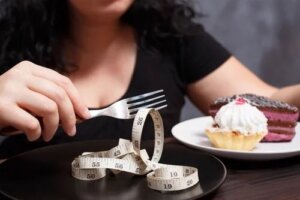Weight Gain and Stress Are Linked

When summer comes around each year, people stress about whether they’ll fit into their summer clothes. This leads them to start a strict regime of no bread, no alcohol, no desserts, and no fats in order to lose some weight.
At the same time, your mind starts to anticipate the sense of sacrifice and suffering you’ll inevitably feel in fighting the hunger and cravings of your upcoming weight loss regime.
The worst thing is that, despite following a calorie-controlled diet, sometimes you don’t lose as much weight as you want to. However, it might be more advisable to relax more, instead of just eating less.
This is because the stress and anxiety caused by the decision to go on a diet can increase your appetite and make you accumulate more fat. Experts believe that this is due to the action of certain hormones.
In short, the best solution for weight loss could be to calm down, practice mind-body exercises (yoga, meditation, mindfulness, etc.), do some exercise (for example, walking at a good pace every day), and eat a balanced diet. This is because everything seems to point to the fact that stress promotes weight gain.

Stress dysregulates appetite, leading to weight gain
Ghrelin is a hormone that stimulates your appetite. It also plays a role in the metabolism of fats and sugars. Furthermore, when it reaches the blood of your brain, it regulates the functions associated with your management of tension.
When you’re stressed, your levels of ghrelin change. This, in turn, affects your behavior, your mood, and your metabolism. In other words, stress leads to increased ghrelin levels, which increases your appetite.
Some recent studies confirm that ghrelin also plays a role in stress, anxiety, and depression. In fact, this hormone could protect against the psychological burden caused by constant stress. However, the downside is that it leads to weight gain.
When you decide to eat less, your ghrelin production increases. This continues even just after you’ve finished eating. Therefore, rather than feeling satiated, you feel frustrated, which adds to your stress. In addition, ghrelin stimulates the production of cortisol. This is another hormone that increases when you’re stressed.
The yin and yang of cortisol in weight gain
Cortisol performs multiple actions. It’s often classified as “the stress hormone”. It has several functions in metabolism, like maintaining blood glucose levels.
In normal situations, your body has higher levels of cortisol in the early morning and after lunch. This hormone helps to generate glucose from fats. However, it doesn’t produce the same effects when it increases in a timely manner as to when it’s irregularly elevated.
In fact, when your cortisol levels rise more frequently than they should, the opposite effect can occur. In other words, it increases fat buildup in the belly.
Stress and knowing when you’ve had enough
Leptin is a hormone that tells you you’ve had enough after you’ve eaten. In other words, it decreases your appetite. Sometimes, if you don’t feel satiated after eating, it might be because your leptin levels are too low.
In fact, many people who are overweight or obese develop leptin resistance. This means they feel less full, leading them to overeat.
Recent studies indicate that leptin is also affected by stress. This would reduce satiety when eating.
Living to eat
Many other factors linked to stress increase your appetite. For example, not getting enough sleep, irregular mealtimes, not eating enough fiber in your diet, or taking antidepressants and anxiolytics.
In short, sometimes food doesn’t meet your metabolic needs. Instead, you might use it to fill gaps in your increasingly stressful lifestyle. For this reason, if you want to fit into your summer clothes, maybe you should take life a bit slower and be kind to yourself. You might find that food then becomes a secondary factor.
When summer comes around each year, people stress about whether they’ll fit into their summer clothes. This leads them to start a strict regime of no bread, no alcohol, no desserts, and no fats in order to lose some weight.
At the same time, your mind starts to anticipate the sense of sacrifice and suffering you’ll inevitably feel in fighting the hunger and cravings of your upcoming weight loss regime.
The worst thing is that, despite following a calorie-controlled diet, sometimes you don’t lose as much weight as you want to. However, it might be more advisable to relax more, instead of just eating less.
This is because the stress and anxiety caused by the decision to go on a diet can increase your appetite and make you accumulate more fat. Experts believe that this is due to the action of certain hormones.
In short, the best solution for weight loss could be to calm down, practice mind-body exercises (yoga, meditation, mindfulness, etc.), do some exercise (for example, walking at a good pace every day), and eat a balanced diet. This is because everything seems to point to the fact that stress promotes weight gain.

Stress dysregulates appetite, leading to weight gain
Ghrelin is a hormone that stimulates your appetite. It also plays a role in the metabolism of fats and sugars. Furthermore, when it reaches the blood of your brain, it regulates the functions associated with your management of tension.
When you’re stressed, your levels of ghrelin change. This, in turn, affects your behavior, your mood, and your metabolism. In other words, stress leads to increased ghrelin levels, which increases your appetite.
Some recent studies confirm that ghrelin also plays a role in stress, anxiety, and depression. In fact, this hormone could protect against the psychological burden caused by constant stress. However, the downside is that it leads to weight gain.
When you decide to eat less, your ghrelin production increases. This continues even just after you’ve finished eating. Therefore, rather than feeling satiated, you feel frustrated, which adds to your stress. In addition, ghrelin stimulates the production of cortisol. This is another hormone that increases when you’re stressed.
The yin and yang of cortisol in weight gain
Cortisol performs multiple actions. It’s often classified as “the stress hormone”. It has several functions in metabolism, like maintaining blood glucose levels.
In normal situations, your body has higher levels of cortisol in the early morning and after lunch. This hormone helps to generate glucose from fats. However, it doesn’t produce the same effects when it increases in a timely manner as to when it’s irregularly elevated.
In fact, when your cortisol levels rise more frequently than they should, the opposite effect can occur. In other words, it increases fat buildup in the belly.
Stress and knowing when you’ve had enough
Leptin is a hormone that tells you you’ve had enough after you’ve eaten. In other words, it decreases your appetite. Sometimes, if you don’t feel satiated after eating, it might be because your leptin levels are too low.
In fact, many people who are overweight or obese develop leptin resistance. This means they feel less full, leading them to overeat.
Recent studies indicate that leptin is also affected by stress. This would reduce satiety when eating.
Living to eat
Many other factors linked to stress increase your appetite. For example, not getting enough sleep, irregular mealtimes, not eating enough fiber in your diet, or taking antidepressants and anxiolytics.
In short, sometimes food doesn’t meet your metabolic needs. Instead, you might use it to fill gaps in your increasingly stressful lifestyle. For this reason, if you want to fit into your summer clothes, maybe you should take life a bit slower and be kind to yourself. You might find that food then becomes a secondary factor.
This text is provided for informational purposes only and does not replace consultation with a professional. If in doubt, consult your specialist.







